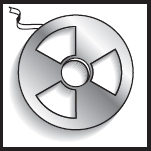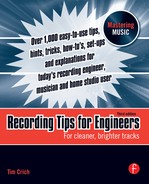
CHAPTER 1
The Recording Engineer

This book is for the recording engineer who knows what a compressor or limiter or equalizer does. He wants to know the tried and true methods of using all of the equipment presently available.
The recording engineer is responsible for keeping the session running smoothly, including setting up the control room, choosing the microphones, organizing the signal flow, choosing the track layout, getting the sounds, and pressing the record button. Good sounds or bad, the buck stops with the recording engineer.
Becoming a Better Recording Engineer
• Praise the lowered. Work at lower volume levels. The sounds will be more accurate and ear fatigue will be minimized. If the level must be loud, get your sounds, insert your earplugs, and turn it up. Occasionally listen at lower levels without the earplugs. There is nothing in the recording studio as important as your hearing. Longevity in the recording industry means good hearing for decades to come. Plus, the loud level might wake up the producer.
• Get musical. Recording music is so much easier if you understand music. Music plays a key role in the vast majority of recordings so most clients prefer ‘musical’ engineers. If you don't play an instrument, buy a guitar or keyboard and learn some basic songs. While learning to play an instrument may seem daunting, you don't need to become a virtuoso player; you just need to grasp song structures and musical progressions. If you get musical, you get work.
• Be consistent. Quality is no accident. Success comes from working every day at your craft, and that requires hard work and dedication. You become what you practice. The ultimate goal is to be the recording engineer that everyone wants to use because of your ears, your expertise, your vibe, and your impressive collection of Ramones T-shirts.
• I'm maintaining. Keep your body well-maintained or long hours will take their toll. Just like your car, if you give it the best gasoline you will get the best results. Eat healthily and drink enough water.
• Be professional. This is your craft and you must work at it. I have seen engineers lose gigs because they got wasted and became an idiot. Do what I do – wait until your day off to start drinking at 7 am.
• Don't get mad, get even. An even temperament goes a long way. Mistakes and frustrations happen in all jobs and, in the long run, so what? A good engineer keeps the session at ease, especially during stressful times. Do you want clients and co-workers to remember you as the engineer who blows up, or the engineer who is a pro and can work around anything?
• A breath of fresh air. When you sit at the console next to someone for hours on end, a toothbrush, mouthwash, and breath mints may be in order.
• Fess up. As the engineer, you are responsible for the content of the recording. If you make a mistake or erase something, say so. You will get more respect in the long run.
• Discrete recording. Discretion for an engineer means knowing when to crank the volume for a playback, when to be quiet and twiddle the knobs, and when to move on. As the engineer, you lead the session. The producer has the road map, but you drive the car.
• Make it look good. Some engineers go through their careers simply setting up a microphone and pressing the record button. Engineering is an art. Much like cooking and sex, presentation is part of the package.
• So shut up already. There's no reason to broadcast to everyone that you are manipulating an instrument or vocal sound. Just quietly do it and, if they ask, tell them any changes are minor. Announcing, ‘I really had to use a lot of equalization on your vocal’ helps no one. Just get the sound and, as Joe Perry said, ‘Let the music do the talking.’
• Record what the song requires. If the song requires bagpipes, don't use something that sounds sort of like bagpipes – get the bagpipes. Whenever you compromise, you might save a couple of hours and a couple of dollars, but a mediocre substitute haunts you long after the money and time are forgotten. Money comes and goes but a recording is timeless. Especially the bagpipes.
• Record an instrument how it's supposed to sound. This may be obvious, but, if you are recording an unfamiliar instrument, go into the studio and listen to the instrument being played. Maybe discuss how it's supposed to sound with the player. Some instruments are heavy within a certain frequency range and are frequency-dependent. If the sound dwells within a limited frequency range, don't ‘fix’ it with processing – record it how it's supposed to sound. Then, if the natural sound of the instrument isn't working, maybe it's the wrong part or the wrong instrument, or both.
• Get a good sound fast. People lose perspective when the engineer takes three hours getting a bass sound. Unless it sounds horrible, move on.
• Spend the most time on the most important factor of the record. If the main part of the session is scheduled for vocals, don't spend hours on the drums.
• A/B and see. Once you have processed a sound, press the bypass button to compare and check that the processed sound is an improvement over the unprocessed sound.
• Leave the solo button alone. An instrument in solo sounds very different when the rest of the tracks are in the monitor mix.
• Use microphone choice, setting, and placement over processing. If you can get a better sound by slightly moving the microphone, do that before adding equalization and compression.
• Commit to the sound. The confident engineer says, ‘This is the sound we want; let's record it,’ rather than, ‘Hey, how's this?’ Unless someone really doesn't like the sound, everyone should go along. But you must be correct. If they don't have confidence in the engineer, things can quickly deteriorate from, ‘Sounds great,’ to, ’Gee I don't know; what do you think?’
• Rule of thumb. Make the guy who signs your check sound best.
Dealing with Clients
• Respect the client. Be punctual. By showing up late, you are saying ‘Your project is not that interesting to me.’ Clients want to be sure you take them seriously. If a few minor things go wrong, one guy always says, ‘Yeah, and he's never on time either.’
In addition, leave your watch at home, remember everybody's name, and consider every band or project you work on as ‘the next big thing.’
• Respect the music. Keep your own funny versions of a client's songs to yourself. Be a professional and respect the people who wrote the lyrics. Don't suggest lyric changes, and never say ‘Y'know, this song sounds just like. .’ This serves no creative purpose and makes the songwriter look like a hack.
• If you want loyalty in the music business, buy a dog. Don't get too attached to a project. They will say they love you, love your engineering, are definitely going to use you next time, you're in the club, the sounds are brilliant. Next week you hear they are using another engineer. Well, don't let it bug you. Do your job, take pride in it, and, at the end of the day, realize that no matter what they promise, you don't have the gig until you're in the chair.
• Save a copy of everything you do. Who knows who the next major stars will be. In addition, you can track your progress as an engineer over the years. Keep a copy – even if you think you will never use it again.
• Seven days in the studio makes one weak. Some clients will expect you to work long hours without a day off. This benefits no one. The eighteenth hour of the tenth day in a row is when mistakes happen. You want your clients to remember you for your skills as an engineer, not for erasing the kick drum due to fatigue. And once you start working long hours, the client expects it.
• Although it may not be your job, keep in mind the budget of the project. Spending tons of time on a part that really isn't that important might take away from precious mixing time. You can't explain away an average mix.
• Watch it or I'll flatten your EQ. If you don't get along with someone in the sessions, deal with it. Probably you (the lowly engineer) will go before he (the high and mighty musician) does. On the other hand, life is too short to take abuse from anyone. But, if you're being ill-treated, give them a serious staring at, then walk.
• Be the heavy. Sometimes the engineer must also be the heavy, doing the unpleasant tasks when sessions get out of hand. State firmly and professionally, ‘You can't smoke in the control room.’ ‘Please don't set your drink on the console.’ ‘You girls put your clothes on this instant!’
Getting Paid
• Don't record for free. Sometimes, to get experience, junior engineers record bands for free. Don't. Engineering a project for ‘nothing’ makes the client think you are worth nothing. Even if it's a token payment of $10 for lunch, take it.
• Due time or do time. Independent engineers often get payment in full without any tax deductions. Because you are a professional, keep all receipts, notes of sessions, who paid what, and all work orders. You know the government and taxes. Man, they make a federal case out of everything.
• A taxman attacks man. Recording engineers have certain tax write-offs. Take advantage of these write-offs. Subscribe to all the applicable magazines. Buy lots of books, meals, tapes, guitar picks, earplugs, hair-plugs, whatever. Write them all off.
• Paper covers rock. Professional-looking paperwork tells your clients you are a professional recording engineer, not some hack with a handwritten invoice and no business card. If you do business like a professional you will be treated like one.
• Now be honest. No matter how hard you work, how great your sound, always be honest and professional in your approach. The industry is small, and bad news travels fast.
Keep Up
• Install a DAW (digital audio workstation) editing program on your computer. Improve your ability to edit, equalize, compress, and record. Before buying any studio software, go online and read some reviews, check out the website, and download demos. All product sellers have websites with demos available. Once armed with the facts, purchase and install the appropriate software and hardware.
Purchase a quality sound card. The cheap sound cards use low-quality electronics that overload sooner.
• Buy at least one good microphone. You'll soon learn its characteristics and be able to compare it with other microphones. When you hear a different microphone next to it, you can say, ’That's a little brighter than mine,’ or ‘The low end is cloudier.’ Today's microphones are inexpensive and high quality.
Beware. The audio industry sometimes goes through ‘fads’ where every studio buys the newest thing, then realizes it isn't so hot. Buy equipment that will last for the long haul – and buy from a reputable dealer.
• The joy of specs. Read all the industry magazines to keep up with the latest technologies. Read all the studio manuals, attend trade shows, surf all the websites, listen to the sound industry CD-ROMs, and check the available equalization and tone reference discs. Grasping all the workings in a modern recording studio can only help you. You can bet the big name recording engineers understand this stuff.
• Use equipment to its max. Don't be too nervous to try new things out. But unless the project has an unlimited budget, most clients don't want to spend hours on end waiting for you to try a groovy new idea. Come in on your own time to work on sounds and ideas, then have them in your arsenal. Lay one of these ideas on the client during the session. Respect soon follows.
Getting Work
• The music business is tough. Work is elusive and you have to hunt it down. Check out all the local studios. Leave a card. Try to get a rapport with certain studios. If you bring in a few bands, you may get a break on the cost of the studio. In addition, if they know you and are familiar with your work, they may call you when they need an engineer.
• Check your hearing. Before you seriously become an active, working recording engineer, get your head, er., hearing examined. If your hearing is questionable, it ain't getting any better. It may be disconcerting if the client sees you adjusting your hearing aid in the session.
• Have ears will travel. Place an ad in the local music paper stating that you are available to record bands at a very reasonable rate. Go to clubs and talk to bands about recording. Print up a demo disc of some of your best work – even if you have to book studio time to do it – and mail it out or hand it out to whomever may be interested.
Include a business card with a contact number. Don't scribble ‘This whole disc was recorded in half an hour in Dave's basement with no overdubs and lots of beer.’ Use professional graphics.
• I love the mall, I love them all. Get to know as many people in the local scene as possible by hanging around the music and recording gear stores, going to shows, and supporting local artists. Small-time recording engineers, managers, and local musicians become big name producers, studio owners, and rock stars.
• He shoots, he scores. Do you play hockey, baseball, bowling, curling, tongue wrestling? Many cities have music industry sports teams. This is a good way to network in the recording industry. There is nothing like getting a little sympathy work, so maybe a puck in the head now and again will help your studio career.
• Intensities in 10 cities. Attend the major audio shows and conventions such as the AES or NAMM. Go to these shows to learn what is on the horizon and to hang out with audio industry leaders.
• Get outta town. You may want to move to a locale that has lots of studios, like LA, NY, or Nashville. There are many secondary markets other than these three, but of course these ones are the main places. Note that, even though there are more studios, there is more competition, and big cities aren't for everyone.
• And on this team. Today, just working as a recording engineer might not bring in enough work. The competition can be fierce. Many engineers are therefore teaming up with people such as producers or mixers and starting their own production companies. With the low cost of equipment, this may be a viable option for some.
• Use your computer to its fullest capacity. Use the Internet to access data on recording studios, new equipment, and newest techniques. There are many websites available to research available recording studios in your area, as well as any new techniques.
Create a file of all the studios, including a short list of the attributes of each and the names of the manager and the owner.
Create a website with your photograph, record credits, availability, etc. Upload your demo and perhaps even parts of songs you have engineered. Do not upload anything that has not yet been officially released.
The computer is a great tool if you are learning to play a musical instrument. Use the computer to take online music lessons, download song tablatures, and maybe even play along with other online learners.
• Start a band. The best way to get as musical as you can is to play music. No matter what level of player you are, there are others out there who are in the same boat. Even if you can only play three chords, start a band and learn some three-chord songs. But don't expect to sell out the local arena; just play for the fun and experience. Playing in a band lets you concentrate on music, timing, tuning, and getting along with musicians. Plus, just saying, ‘Yeah, I'm in a band’ gets you instant status.
